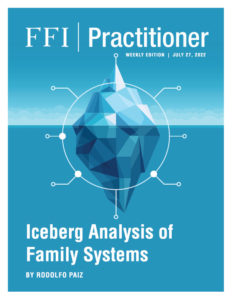
View this edition in our enhanced digital edition format with supporting visual insight and information.
In this week’s FFI Practitioner, FFI Fellow and 2022 FFI International Award recipient Rodolfo Paiz, introduces the “Iceberg Analysis,” a framework that practitioners can use with their family enterprise clients to analyze the entire family enterprise system. In his article, Rodolfo shares the importance of each layer of the iceberg – both above and below the waterline. This article is available in both English and Spanish.
The Family Level of Analysis
The study of “family business” centered initially on “the business,” but gradually became “family enterprise” in recognition of the family’s contribution and of the interdependence between “the family” and “the business.” But most analysis generally focused on individual firms until 2012, when the FFI-Goodman Longevity Study1 proposed a new paradigm: the family level of analysis.
Over decades and generations, entrepreneurial families accumulate resources and knowledge, reducing their failure rates and creating effective business portfolios in which companies succeed, fail, are reinvented, or sold, for the greater good. These portfolios, not the individual firms, are the truest measure of success and value: on average, the families in the FFI-Goodman study had controlled 6.1 firms, created 5.4, added 2.7 [through M&A], spun off 1.5, and shifted industry focus 2.1 times throughout their history.2 The family level of analysis covers all of the family’s personal, business, financial, and ownership activities: it analyzes “the business family” instead of “the family business.”
The needs, challenges, and opportunities of business families have a complexity and interdependence that are not often seen in non-business families. As practitioners, we must ensure that the individual and collective needs of each family are identified, understood, prioritized, and addressed; that they are not overlooked, underestimated, or quietly shunted aside as being too uncomfortable or inconvenient; and that work is done generally in the right order.
The Fidelius Iceberg
At Fidelius, we began implementing “iceberg analysis” in 2012 as a workflow tool when designing family offices. However, we quickly realized that it had broader application and it has since become an integral part of our consulting methodology. The well-known symbolism of the iceberg teaches the essential lessons of this exercise clearly and intuitively.
First, the importance of the waterline: it represents the boundary between the family system and the outside world. Most of an iceberg’s mass lies below the waterline, which helps the family internalize that most of the work to be done lies within the family system. Also, working “underwater” feels different and requires different skills.
Second, wealth is a consequence of all the other layers: without the ice below the waterline, there would be no “tip of the iceberg” at all! Many see wealthy families working on governance, education, and support services and assume that only the wealthy need or benefit from those tools. But the reverse is true: families who build a strong foundation of “underwater ice” become wealthier, while families who lose ice below the waterline eventually become poorer, as the tip of their iceberg inexorably sinks beneath the waves. Non-financial wealth (for example, education, reputation, values, cohesion, all below the waterline) is vastly more important than money.
Third, depth matters. Ice submerged in water pushes up, and ice submerged deeper pushes up harder. The most important layer of ice is the lowest, supporting all the others, and changes there will have the greatest effect on the rest of the iceberg. Each layer is more important than the layers above it.
Fourth, icebergs don’t float in a vacuum. The salinity, temperature, and currents of the ocean around it matter, just as the social, economic, and political aspects of the family’s environment will influence its decisions and priorities.
And fifth, we must resist the inevitable temptation to focus on what’s easily visible and in a comfortable environment. While the deepest layers of ice are subject to greater pressure, very little light, and stronger, unpredictable currents, they are the most important. With few exceptions, we must start working at the lowest layer and then work our way up the iceberg, layer by layer.
The Six Layers of the Iceberg
Every layer of the iceberg represents essential needs that are universal to every family. The base and most crucial layer is Family: the health and well-being of the family itself without any business or ownership considerations. This layer includes family meetings, vacations, play time, rituals, traditions, conflict management, and anything else that maintains or improves the well-being of the family. Within hard-working business families, it’s hard to prioritize such “luxuries,” and they are often undervalued and neglected, but they are vital.
It is important that both practitioners and families avoid the trap of seeking unattainable or inappropriate outcomes based on faulty assumptions. The theoretical ideal of a tight-knit, loving, and cohesive family does not always apply! A family that lacks attachment to each other, spends little time together, and whose intra-familial relationships are just the basic formalities, may still be happy to work and invest together, and we should seek to optimize their situation without superimposing counterproductive values or judgments.
Lifelong Education is important to avoiding the potential pitfalls of generational transitions. Each generation lives different lives than their parents did and must be adept at handling different opportunities, challenges, and responsibilities. Members of the senior generation can learn to transition gracefully into new life stages without harming the business or ownership interests of the family by clinging to past glory or resisting change. The entire family can learn new skills over time: investing requires different skills than running a business, and cousins work together differently than siblings do.
A family enterprise that has developed effective practices in the Family and Education layers will next benefit from having effective Governance throughout the family system. Businesses (even startups!) benefit from having boards to see the forest when entrepreneurs focus on the trees. Owners need to agree on rules for entry, exit, compensation, and much more, to align their interests and expectations. Numerous agreements must be in place across the family, business, and ownership circles for the family system to function smoothly, successfully, and sustainably over time. Governance turns our beliefs, principles, and values into actions.
Do this work with care: working on these deeper layers of Family, Education, and Governance defines, and even changes, who you are. Creating, identifying, or refining the family’s shared dreams, agreements, and structures requires self-awareness, introspection, and dedication of significant time and energy to the family’s soul: identity, purpose, values, taboos, dreams, and nightmares. It can be both challenging and risky for families to undertake significant changes without an expert facilitator and guide.
With the People and Businesses layers, we move to implementation: given this family’s choices on the Family, Education, and Governance layers, what does each person and each business within the family system need to thrive, and how can we, as practitioners, help to provide that? Consider the support and resources that could be beneficial: legal, fiscal, financial, security, concierge, coaching, counseling, logistical, health (physical/mental/emotional), and every other kind. Ask which of these resources each particular family may desire the most. If this sounds like luxury, set your prejudice aside: the reduced friction (effort/risk) and increased probability of success for people and businesses within a cohesive family system are tremendous, priceless advantages.
Finally, the importance of Wealth is usually distorted. Every family should track its financial and non-financial wealth. Every family should teach its children financial responsibility— every family, wealthy or not. Wealth can help us live safer, more comfortable lives with greater opportunities, but it cannot directly create happiness, harmony, or togetherness. Wealth is a result of what we do in every other layer: a healthy balance is essential.
A Note About Family Offices
The field of family systems enjoys remarkable harmony: best practices and proven concepts tend to be customized to each family system, but most enjoy widespread acceptance. The family office is the most prominent exception to that rule.
It’s common, but wrong, to hear family offices defined as wealth managers for families. Family offices operate in any or all the layers of the iceberg, for one family or many. Each is unique. However, each family office should serve in a fiduciary role, always doing what’s best for the family. This “office of the family” can be a critical part of family-systems governance, and business families should define their own family office needs before designing one.
Conclusion
If practitioners switch their thinking to the family level of analysis, it is a much clearer lens through which to view family systems. Then, to improve a family’s health, happiness, and success, try an “iceberg analysis” to work through each layer, from bottom to top:
- Explore the conceptual lessons described herein;
- Identify and understand the needs of the family and its members;
- Prioritize those needs and discuss how best to meet them; and
- Define or design the family office.
References
1Zellweger, T.M., Nason, R.S., & Nordqvist, M. (2012). From Longevity of Firms to Transgenerational Entrepreneurship of Families: Introducing Family Entrepreneurial Orientation. Family Business Review, 25(2), 136–155. https://doi.org/10.11222/0894486511423531
2Zellweger et al., p. 143.
About the Contributor

Rodolfo Paiz, FFI Fellow and 2022 FFI International Award recipient, has been a trusted advisor to family systems in nearly every country across the Americas. He is the founder and CEO of Fidelius, a first-generation family business created to help business families make optimal decisions on core issues like parenting, systemic governance, strategy, and wealth. He has served on the FFI board and on the FFI Practitioner editorial committee, and he is a strong advocate for the strengths and advantages of family systems. He can be reached at rodolfo@fidelius.com.

View this edition in our enhanced digital edition format with supporting visual insight and information.





